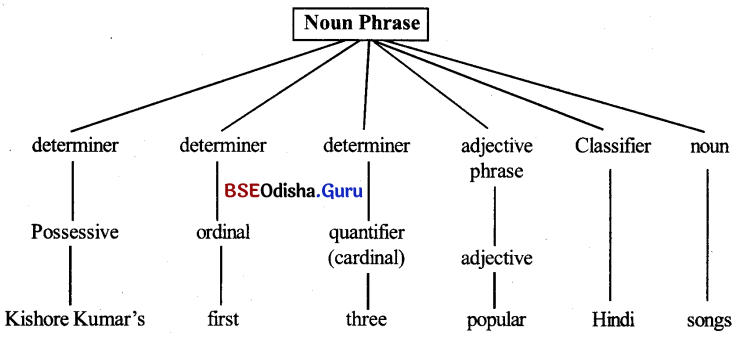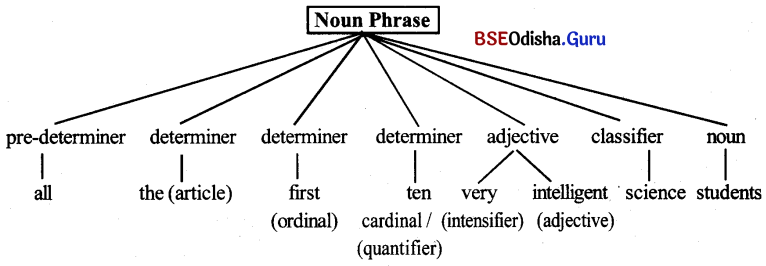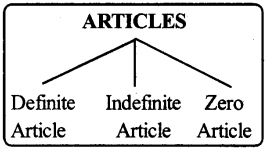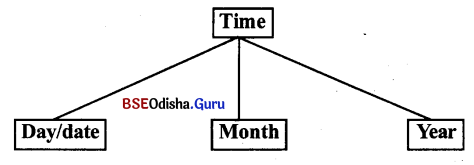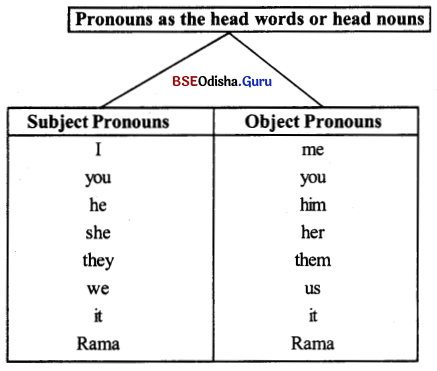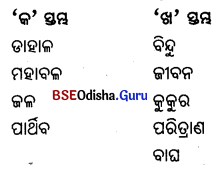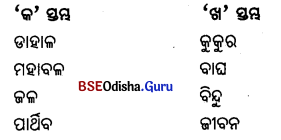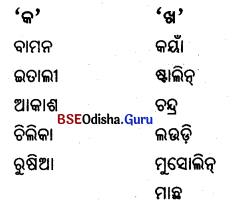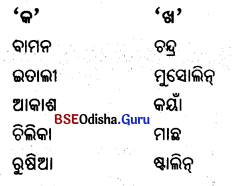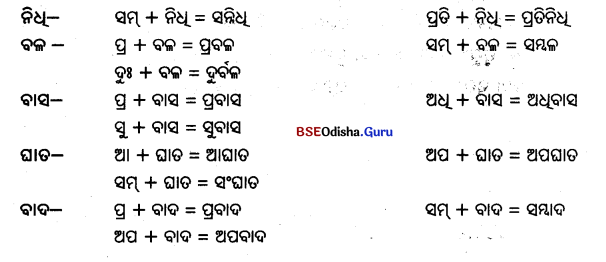Odisha State Board BSE Odisha Class 9 English Grammar Book Solutions Chapter 7 Countables and Uncountables Textbook Exercise Activity Questions and Answers.
BSE Odisha Class 9 English Grammar Solutions Chapter 7 Countables and Uncountables
⇒ Look at the following dialogue / conversation (ନିମ୍ନୋକ୍ତ କଥୋପକଥନକୁ ଲକ୍ଷ୍ୟକର)
Amar: What are you going to buy today, Samar?
Samar : I have to buy (କିଣିବାର ଅଛି) rice, sugar, dal, ghee, mustard (ସୋରିଷ), cheese (ଛେନା), an umbrella and some apples. What are going to buy, Amar?
Amar: I’ve to buy a pen, a pencil, a book, some paper, a cup, butter, milk, bananas and some other vegetables.
ଏହି କଥୋପକଥନରେ ବ୍ୟବହୃତ ଶବ୍ଦଗୁଡ଼ିକ ହେଉଛି ଗୋଟିଏ ଗୋଟିଏ Noun ବା ବିଶେଷ୍ୟପଦ ଯାହାକି ବିଭିନ୍ନ ବସ୍ତୁ ବା ପଦାର୍ଥର ନାମକୁ ସୂଚିତ କରୁଛି । ଏ ସମସ୍ତ Noun (ବିଶେଷ୍ୟପଦ) ମୁଖ୍ୟତଃ ୨ ଭାଗରେ ବିଭକ୍ତ; ଯଥା— (i) Countables (Count Noun) ଏବଂ (ii) Uncountables (Uncount Noun)
⇒ Count Noun (ଗଣନୀୟ ବିଶେଷ୍ୟ)
The Noun that can be counted is called Countable or Count Noun and it has both singular and plural number form. (ଯେଉଁ ବିଶେଷ୍ୟପଦକୁ ଗଣି ହୁଏ ଓ ଏହାର ଏକବଚନୀୟ ଓ ବହୁବଚନୀୟ ରୂପ ଅଛି, ତାହାକୁ ଗଣନୀୟ ବିଶେଷ୍ୟ କୁହାଯାଏ ।)
ଉପରଲିଖତ କଥାବାର୍ତ୍ତାରେ ବ୍ୟବହୃତ Count Noun ଗୁଡ଼ିକ ହେଲା – umbrella (one), apples (plural), pen (one), pencil (one), cap (one), bananas (plural), vegetables (plural).
Uncount Noun ଗୁଡ଼ିକ ହେଲା : rice, sugar, dal, ghee, mustard, cheese, paper, butter and milk.
⇒ Uncount Noun (ଅଗଣନୀୟ ବିଶେଷ୍ୟ)
The Noun that can’t be counted and has no plural number form is called Uncountable or Uncount Noun. (ଯେଉଁ ବିଶେଷ୍ୟପଦକୁ ଗଣିହୁଏ ନାହିଁ ଓ ଏହାର ବହୁବଚନୀୟ ରୂପ ନାହିଁ, ତାହାକୁ ଅଗଣନୀୟ ବିଶେଷ୍ୟପଦ କୁହାଯାଏ ।)
![]()
Remember:
An Uncount Noun is neither singular nor plural, since it can’t be counted. (ଗୋଟିଏ Uncount Noun ଏକବଚନ କି ବହୁବଚନ ନୁହେଁ; ଯେହେତୁ ଏହାକୁ ଗଣିହୁଏ ନାହିଁ ।)
‘-s’ ବା ‘-es’ morpheme ବା ରୂପିମରେ ଥିବା କେତେକ noun ‘Uncountable Noun’ ଶ୍ରେଣୀର । ଯଥା – mathematics, physics (ପଦାର୍ଥବିଜ୍ଞାନ), economics (ଅର୍ଥନୀତି), measles (ମିଳିମିଳା), mumps (ଗଳାଫୁଲା ରୋଗ), news (ସମ୍ବାଦ ସମାଚାର), politics (ରାଜନୀତି) etc.
⇒ Commonly used Uncount Nouns :
accommodation (ରହିବା ଘର ବାସଘର ବ୍ୟବସ୍ଥା),
behaviour (ବ୍ୟବହାର)
bread, coffee, damage, tea, milk, dust, traffic, scenery (ଦୃଶ୍ୟ),
poetry (କବିତାବଳୀ)
equipment (ସରଞ୍ଜାମ)
grass, information, progress (ଉନ୍ନତି)
machinery (ଯନ୍ତ୍ରପାତି)
employment (ରୋଜଗାର)
furniture ( ଆସବାବପତ୍ର ଘରର ଉପକରଣ)
rain, juice (ରସ)
toothache (ଦାନ୍ତବିନ୍ଧା)
news, postage, permission, stomachache (ପେଟ ଯନ୍ତ୍ରଣା)
weather (ପାଗ)
money, waste (ନଷ୍ଟ)
jealousy (ଈର୍ଷା)
wine (ମଦ)
soap (ସାବୁନ)
wood (କାଠ)
coal (କୋଇଲା)
salt (ଲୁଣ)
toothache (ଦାନ୍ତବିନ୍ଧା)
copper (ତମ୍ବା)
climate (ଜଳବାୟୁ)
work, water, anger (କ୍ରୋଧ)
affection (ସ୍ନେହ)
ink (କାଳି)
paper (କାଗଜ)
gold (ସୁନା)
diamond (ହୀରା)
dal (ଡାଲି)
sugar (ଚିନି)
hatred (ଘୃଣା)
oxygen, nitrogen, carbon (ଅଙ୍ଗାର) etc.
An Uncount Noun takes Singular Verb (is/was/has/does/Main Verb + s)
(Uncount Noun ପାଖରେ ଏକବଚନୀୟ କ୍ରିୟାପଦ ବ୍ୟବହୃତ ହୁଏ ।)
Examples:
Mathematics (Uncount Noun) is my favorite subject.
The furniture (Uncount Noun) in our house has been sold out.
The information (Uncount Noun) is wrong.
The poetry (Uncount Noun) gives pleasure to the mind.
The progress (Uncount Noun) of this boy in English is rapid.
The traffic (Uncount Noun) turns to the west.
His trouble (Uncount Noun) was that he didn’t understand me.
Some Count Nouns look Singular in form but always take Plural Verbs.
(କେତେକ ଗଣନୀୟ ବିଶେଷ୍ୟ ଗଠନରେ ଏକବଚନଭଳି ଦେଖାଯାଉଥିଲେ ମଧ୍ୟ ଅର୍ଥରେ ବହୁବଚନକୁ ସୂଚିତ କରୁଥୁବାରୁ, ସେଗୁଡ଼ିକ ସହିତ ବ୍ୟବହୃତ ହୁଏ ।)
ଯଥା – (i) The police are on duty. (are = Plural Verb)
(ii) The cattle were grazing in the field.
(iii) The public demand justice. (ନ୍ୟାୟ)
(iv) People in villages live in peace. (ଶାନ୍ତିରେ ବାସକରନ୍ତି )
(v) The rich have a lot of money. (ପ୍ରଚୁର ଟଙ୍କା ଅଛି)
(vi) The blind need our help.
![]()
⇒ Plural count nouns ହେଲା cattle, public, people, rich, blind ।
କେତେକ Plural Nouns; ଯଥା – annals (ପୃଷ୍ଠା), arms (ଅସ୍ତ୍ରଶସ୍ତ୍ର), ashes (ପାଉଁଶ), assets (ସମ୍ପରି), clothes, customs (ଶୁଳ୍କ), environs (ପରିବେଶ), fetters (ବେଢ଼ି), savings (ସଂଚିତ ଅର୍ଥ), remains (ଅବଶିଷ୍ଟାଶ), wages (ମଜୁରି), tidings (ଖବର), statistics (ପରିସଂଖ୍ୟାନ), spectacles (ଦୃଶ୍ୟସମୂହ), adds (ସମ୍ଭାବନା) ଇତ୍ୟାଦି ସର୍ବଦା Plural form; ଯଥା ‘ – s’ ବା ‘– es’ ରେ ଶେଷ ହୁଏ ।

⇒ Nouns used both as Count Nouns and Uncount Nouns
(ଉଭୟ ଗଣନୀୟ ଓ ଅଗଣନୀୟ ବିଶେଷ୍ୟ ରୂପେ କାର୍ଯ୍ୟ କରୁଥିବା Nouns)
| Uncount Nouns | Count Nouns |
| work (କାର୍ଯ୍ୟ) | a piece of work (ଗୋଟିଏ କାର୍ଯ୍ୟ) ବା works (ଲେଖାସବୁ) |
| employment (ଚାକିରି) | a job (ଗୋଟିଏ ଚାକିରି) |
| poetry (କବିତାସମୂହ) | a poem/ poems (ଗୋଟିଏ / ଅନେକ କବିତା) |
| furniture (ଉପକରଣ) | a piece of / five pieces of furniture |
| wood (କାଠ) | a piece of / three pieces of wood |
| chocolate | a bar / two bars of chocolate |
| news (ଖବର) | a piece of news (ଗୋଟିଏ ଖବରକାଗଜ) |
| paper (କାଗଜ) | a sheet of paper (ଫର୍ଭେ କାଗଜ) |
| grass (ଘାସ) | a blade of grass (ଗୋଟିଏ ଘାସ) |
| bread (ରୁଟି ପାଉଁରୁଟି) | a slice/a loaf of bread (ପଟେ) |
| soap (ସାବୁନ) | a cake of soap (ଖଣ୍ଡେ ସାବୁନ) |
| information (ସୂଚନା) | a piece of information (ଗୋଟିଏ ସୂଚନା) |
| knowledge (ଜ୍ଞାନ) | a fact / facts ( ସତ୍ୟ ଘଟଣା) |
| machinery (ଯନ୍ତ୍ରପାତି) | a machine (ଗୋଟିଏ ଯନ୍ତ୍ର) |
| chalk (ଚକ୍) | a stick of chalk (ଗୋଟିଏ ଚକ) |
| cheese (ଛେନା) | a piece of cheese (ଖଣ୍ଡେ ଛେନା) |
| tea | a cup of tea (କପେ ଚା’) |
| water (ଜଳ) | a drop/glass/cup/pail/bucket (ବାଲି) of water/waters (ଜଳରାଶି) |
| salt (ଲୁଣ) | a pinch of salt ( ଚିମୁଟାଏ ଲୁଣ)/a kilo of salt |
| milk (କ୍ଷୀର) | a glass of milk (ଗିଲାସେ କ୍ଷୀର) |
| advice (ଉପଦେଶ) | a piece of advice (ଗୋଟିଏ ଉପଦେଶ) |
| thunder (ବଜ୍ରପାତ) | a peal of thunder (ବଜ୍ରପାତ) |
| lightning (ବିଜୁଳି) | a flash of lightning (ବିଜୁଳିର ଏକ ଝଲକ) |
⇒ Correct the Errors (On Count and Uncount Nouns) (ଭୁଲ୍ ଥୁଲେ ଠିକ୍ କର ।)
(i) He gave me some advices.
Answer:
He gave me some advice or some pieces of advice.
(ii) Please give the beggar a bread.
Answer:
Please give the beggar a slice / a loaf of bread.
(iii) The furnitures are second-class (old).
Answer:
The furniture is second-class.
(iv) The waters of this lake looks terrible.
Answer:
The waters (ଜଳରାଶି ) of this lake look terrible. (ଭୟଙ୍କର)
(v) He has a lot of wealths.
Answer:
He has a lot of wealth.
![]()
(vi) Where do the traffic go?
Answer:
Where does the traffic go?
(vii) What is your politics?
Answer:
What are your politics? (ରାଜନୈତିକ)
(viii) The saving in the bank are increasing.
Answer:
The savings in the bank are increasing.
(ix) Father is reading paper.
Answer:
Father is reading a paper. (ଗୋଟିଏ ଖବରକାଗଜ)
(x) Economics have so many complexities.
Answer:
Economics has so many complexities. (ଜଟିଳ ବିଷୟଗୁଡ଼ିକ)
One word used as both Count Noun and Uncount Noun
Room:
Count Noun: This building has five rooms.
Uncount Noun: Do I have some room in your car? (sitting place)
Noise:
Count Noun: I can hear a noise. (ଏକପ୍ରକାର ପାଟିତୁଣ୍ଡ)
Uncount Noun: Too much noise affects our ears.
Time:
Count Noun: There was a time when people were happy.
Uncount Noun: Please tell me the time.
Trouble:
Count Noun: My sister is having a trouble. (problem)
Uncount Noun: I have trouble with my eyes. He had heart trouble. (diseases)
Fire:
Count Noun: Mother is making a fire in the stove.
Uncount Noun: Fire can destroy everything.
Fish:
Count Noun: He has a big fish in his hand.
Uncount Noun: This river has a lot of fish.
Work:
Count Noun : Have you read the works of Fakirmohan? (books) I have a piece of work to do.
Uncount Noun: Work is worship.
He did the work in time.
Singular And Plural Forms of Count Noun (Count Noun ର ଏକବଚନ ଓ ବହୁବଚନ ରୂପ)
Singular Count Noun refers to single person, thing, animals, etc.
Plural Count Noun refers to plural number of person, thing, animal, etc.
| Singular Count Noun | Plural Count Noun |
| boy | boys |
| bamboo (ବାଉଁଶ)/cuckoo (କୁକୁଡ଼ା) | bamboos/cuckoos |
| studio/radio/piano | studios/radios/pianos |
| photo | photos |
| match (ମ୍ୟାଚ୍) (ch – ଚ) | matches |
| watch | watches |
| witch (ଡାହାଣୀ) | witches |
| bench | benches |
| monarch (ch – କ୍) (ଅଧୀଶ୍ବର) | monarchs |
| stomach (ପ୍ରାକସ୍ଥଳୀ) | stomachs |
| fly (ମାଛି) / lady (ମହିଳା) | flies/ladies |
| spy (ସିପାହୀ / ଗୁପ୍ତଚର) | spies |
| army (ସେନାବାହିନୀ) | armies |
| company | companies |
| day/monkey/donkey | days/monkeys/donkeys |
| valley (ଉପତ୍ୟକା) | valleys |
| mosquito (ମଶା) | mosquitoes |
| buffalo (ବାଘ) | buffaloes |
| potato (ଆଳୁ) | potatoes |
| hero/tomato | heroes/tomatoes |
| half/calf/loaf/wife | halves/calves/loaves/wives |
| shelf (ଥାକ) / leaf (ପତ୍ର) | shelves/leaves |
| roof/chief/proof/hoof/gulf (ଉପସାଗର) | roofs/chiefs/proofs/hoofs/gulfs |
| man/foot/tooth/goose | men/feet/teeth/geese |
| mouse / louse (ଉକୁଶା) | mice/lice |
| woman | women |
| child | children |
| ox | oxen (ବଳଦଗୁଡ଼ିକ) |
| radius (ବ୍ୟାସାର୍ଦ୍ଧ) | radii |
| oasis (ମରୂଦ୍ୟାନ) | oases |
| swine (ଘୁଷୁରୀ) | swine (also) swines |
| analysis (ବିଶ୍ଳେଷଣ) | analyses |
| crisis (ସଙ୍କଟ) | crises |
| deer (ହରିଣ) / sheep | deer/sheep |
| comman der-in-chief (ସେନାଧ୍ଯକ୍ଷ) | commanders-in-chief |
| mother-in-law (ଶାଶୁ) | mothers-in-law |
| father-in-law (ଶ୍ୱଶୁର) | fathers-in-law |
| brother-in-law (ଶଳା ଭିଣୋଇ) | brothers-in-law |
| son-in-law (ଜ୍ବାଇଁ) | sons-in-law |
| co-husband (ସମୁଦି) | co-husbands |
| co-wife (ସମୁଦୁଣୀ) | co-wives |
| sister-in-law (ଭାଉଜ) | sisters-in-law |
| daughter-in-law (ବୋହୂ) | daughters-in-law |
| step-mother | step-mothers |
| maid-servant (ଚାକରାଣୀ) | maid-servants |
| man-servant (ଚାକର) | men-servants |
| woman-doctor (ମହିଳା ଡାକ୍ତର) | women-doctors |
| syllabus (ପାଠ୍ୟକ୍ରମ) | syllabi |
| curriculum (ପାଠ୍ୟକ୍ରମ) | curricula |
| memorandum (ସ୍ମରଣୀକା) | memoranda |
| corrigendum (ସଂଶୋଧନ ପତ୍ର) | corrigenda |
| millennium (ସହସ୍ରାବ୍ଦ) | millennia |
| formulae (ଧାରା) | formula |
| bacterium (କବକ) | bacteria |
| datum (ତଥ୍ୟ) | data |
![]()
Read the following passage and underline the nouns. (ବିଶେଷ୍ୟପଦଗୁଡ଼ିକୁ ରେଖାଙ୍କିତ କର ।)
My little friend drives his cows and goats into the field every morning. He leads his herd to that part of the field where grass grows well. While the cows and goats enjoy the grass, he sits under a tree and plays music on the flute. When he feels hungry, he eats the food he carries from home and drinks water from the stream. Sometimes he plays on the sand or makes beautiful toys of clay and mud.
Answers:
My little friend drives his cows and goats into the field every morning. He leads his herd (ଗୋରୁ) to that part of the field where grass grows well. While the cows and goats enjoy the grass, he sits under a tree and plays music on the flute (ବଂଶୀ). When he feels hungry, he eats the food he carries from home and drinks water from the stream (ଝରଣା/ନଦୀ). Sometimes he plays on the sand or makes beautiful toys of clay and mud.
Textual Activities With Answers
Activity – 1
Now work in pairs. Identify the nouns from the above passage and write them in the appropriate boxes given below. (ଉପର ଅନୁଚ୍ଛେଦରୁ ବିଶେଷ୍ୟପଦଗୁଡ଼ିକୁ ଚିହ୍ନଟ କର ଓ ତଳ ବାକ୍ସ ଭିତରେ ଲେଖ ।)
| Nouns before which we can use a / an, one, two, many, (a) few etc | Nouns which don’t usually go with a / an, one, two, many, (a) few |
| a / one tree two / many trees
|
grass
|
Answer:
| Noun before which we can use a / an, one, two, many, (a few) etc | Nouns which don’t usually go with a / an, one, two, many, a few |
| a / one tree | grass |
| two / many trees | water |
| a few / many / hundred cows/goats | food |
| one / ten / a lot of flutes | music |
| two / a few streams | clav |
| a / a few / many fields | mud |
| a herd / five herds | sand |
Activity – 2
Here is a list of things. Put them into two separate columns: Countables in column – A and Uncountables in column – B. (ବାକ୍ସଭିତରେ ପଦାର୍ଥଗୁଡ଼ିକୁ ସେମାନଙ୍କର ଗଣନୀୟ ଓ ଅଗଣନୀୟତା ଆଧାର କରି Countable noun ତଳେ ଓ Uncountable noun ତଳେ ବ୍ୟବହାର କର ।) (water, newspaper, bread, egg, tea, milk, cheese, pen, soap, book, coffee, paper, wheat flour, paste, sugar, magazine, jam, potato, scale, bottle, bag, jar, mug)
| Column-A List of countables |
Column – B List of uncountables |
| newspaper
|
water
|
Answer:
| Column-A List of countables (ଗଣନୀୟ ବିଶେଷ୍ୟ) |
Column – B List of uncountables (ଅଗଣନୀୟ ବିଶେଷ୍ୟ) |
| newspaper egg pen book magazine (ପତ୍ରିକା) potato scale ନିକିତି bottle, bag, jar, mug |
water bread egg tea milk cheese (ଛେନା) soap (ସାବୁନ) wheat flour (ଗହମ ଅଟା) paste, sugar, jam, paper |
⇒ Here the difference between Countables and Uncountables :
egg (ଅଣ୍ଡା) : Give me an egg. (Countable)
There is some egg on your chin (ଚିବୁକ). (Uncountable) (ସିଝା ଅଣ୍ଡାର ଅଂଶ)
Paper (ଖବରକାଗଜ) : Rajashree is reading a paper (Countable).
Paper is white. (Uncountable)
tea (ଚାହା) : Give me a little tea to drink. (Uncountable)
Have two teas, please. (Countable) (ଦୁଇ କପ୍ ଚାହା)
![]()
Activity – 3
B. The following is an entry in the diary of Rita. In some places she has wrongly written the plural forms of some nouns. Underline the mistakes and write their correct forms in the right hand margin. (ଏଠାରେ ରୀତାର ନିତିଦିନିଆ କାର୍ଯ୍ୟବିବରଣୀ ପୁସ୍ତିକାରେ ରୀତା କେତେକ ବିଶେଷ୍ୟପଦର ବହୁବଚନ ରୂପ ଭୁଲ ରୂପେ ଲେଖୁଦେଇଛି / ଭୁଲଗୁଡ଼ିକୁ ରେଖାଙ୍କିତ କରି ଡାହାଣ ପାର୍ଶ୍ଵରେ ଠିକ୍ ଶବ୍ଦ ଲେଖ ।)
6 April: Today was Sunday. I got up late in the morning. After brushing my tooths I had some cakes for breakfast. Then I did my lessons for an hour. I had to make a list of the political partys of our state and the names of the countrys of parties, countries Asia. After completing homework I went to the kitchen to help my mother. I cut the vegetable leafs, potatos and tomatos and kept them neatly on the plates. In the afternoon I fed the goats, cowes and sheeps. In the evening I washed my hands and foots and sat down to read. Then my younger sisters came with their toyes to play with me. We played for some time. At bedtime, I told them some nice storys and slept.
Answers:
teeth
parties, countries
leaves, potatoes, tomatoes
cows, sheep
feet
toys
stories
Activity – 4
Look at the names of the things which we use. Mark them and the verbs they take. (ଆମ୍ଭେମାନେ ବ୍ୟବହାର କରୁଥିବା ଜିନିଷଗୁଡ଼ିକର ନାମକୁ ଦେଖ ଓ ସେଗୁଡ଼ିକ ସହିତ ବ୍ୟବହୃତ କ୍ରିୟାପଦଗୁଡ଼ିକୁ ଚିହ୍ନିତ କର ।)
Remember:
The following nouns are called pair nouns since they always come in pairs. (ତଳଲିଖ ବିଶେଷ୍ୟ ପଦଗୁଡ଼ିକୁ pair (ଯୋଡ଼ା) nouns କୁହାଯାଏ କାରଣ ଦୁଇଟିକୁ ନେଇ ସେଗୁଡ଼ିକ ତିଆରି।)
Trousers : My trousers are new.
Scissors : These scissors need sharpening.
Binoculars : These binoculars have powerful lenses.
Goggles : A pair of goggles (ଗୋଟିଏ ଚଷମା) is useful in summer.
Here ‘are’, ‘need’, ‘have’ are all plural verbs (ବହୁବଚନ କ୍ରିୟା).
But a pair of + nouns takes singular verb.
(A pair of + noun ସହିତ ଏକବଚନୀୟ କ୍ରିୟାପଦ ବ୍ୟବହୃତ ହୁଏ ।)
Singular verbs – is, was, does, has, main verb(s)
Plural verbs – are, were, do, have, main verb
Now tick (✔) the right alternatives and strike out the wrong ones. (ଏବେ ଠିକ୍ ବିକଳ୍ପ ଉତ୍ତର ଗୁଡ଼ିକରେ ✔ ଚିହ୍ନ ମାରି ଭୁଲଗୁଡ଼ିକୁ ଛକି ପକାଅ ।)
(a) The above things have two equal/unequal parts.
Answer:
equal(✔) / unequal
(b) They are joined/not joined at one point.
Answer:
joined(✔) / not joined
(c) Together they make one/more than one object.
Answer:
one(✔) / more
(d) We do/do not use plural markers like these and those with them.
Answer:
do(✔) / do not
Activity – 5
Read the following sentences and rewrite them choosing the appropriate ones given in boxes. (ଠିକ୍ noun ଗୁଡ଼ିକୁ ବାଛ ।)
(i) Look at my new jean/jeans.
Answer:
jeans
(ii) Please give my regards/regard to your parents.
Answer:
regards (ନମସ୍କାର)
![]()
(iii) Please cut this with a scissor/scissors.
Answer:
scissors (କଇଁଚି)
(iv) Where is my left shoe/shoes?
Answer:
shoe (ଜୋତା)
(v) I have kept my savings/saving in a bank.
Answer:
savings (ଜମା ଅର୍ଥ)
(vi) Where did you keep my clothes/cloth?
Answer:
clothes (କପଡ଼ା)
(vii) Please take out the content/contents of the box.
Answer:
contents
(viii) The surrounding/surroundings of the school look great.
Answer:
surroundings
Activity – 6
Fill in the blanks with a suitable word/phrase choosing from the brackets. (ସଠିକ୍ ଶବ୍ଦ ବା ବାକ୍ୟଶ ବାଛି ଶୂନ୍ୟସ୍ଥାନ ପୂରଣ କର ।)
(a lot of, no, that, a little, much, enough, some, his, any)
(i) I was guided by ________ advice.
Answer:
his
(ii) I have ________ knowledge of computer.
Answer:
a lot of / a little / some / no
(iii) You need ________ money to buy this.
Answer:
some / a lot of
(iv) Do you have ________ work to do?
Answer:
any /much / enough
(v) Where did you get ________ news?
Answer:
that (ତାହା)
(vi) I got ________ help from him.
Answer:
no / a little / some / a lot of (help = uncount.)
(vii) This room is crowded with ________ luggage.
Answer:
a lot of (luggage = uncount.)
(viii) They have ________ food for the family.
Answer:
a lot of / sufficient / a little (food = uncount.)
(ix) They haven’t left ________ work for me.
Answer:
any
![]()
Here several alternative answers can be used. (ଏହି ଅନୁଶୀଳନୀରେ ଅନେକ ବିକଳ୍ପ ଉତ୍ତର ଦିଆଯାଇପାରିଟ)
| Quantifier ((ପରିମାଣ / ସଂଖ୍ୟାବାଚକ) |
Uncountable/ Countable | not or ? |
| a lot of / lots of (ବହୁତ) | Uncountables | n’t × |
| and Plural Countables | ବା × | |
| much | Uncountables | n’t ବା ? |
| many | Countables (plural) | n’t ବା ? |
| some (କିଛି / କେତେକ) | Uncountables / | n’t × |
| Countables (Plural) | ବା ? × | |
| any (କିଛି / କେତେକ) | Uncountable / Countable | n’t ବା ? × |
| (ଏଠାରେ n’t ର ଅର୍ଥ ବ୍ୟବହୃତ ନ ହୋଇ) |
Activity – 7
Below you find a list of uncountable nouns. Arrange them under their appropriate heads. One has been written under each head for you. (ତଳେ ଅଗଣନୀୟ ବିଶେଷ୍ୟପଦମାନଙ୍କର ଏକ ତାଲିକା ପ୍ରଦାନ କରାଯାଇଛି / ସେଗୁଡ଼ିକୁ ସଠିକ ସ୍ତମ୍ଭ ତଳେ ରଖୁ ସଜାଅ ।)
(courage, wood, coal, anger, gold, rice, happiness, bravery, joy, cotton, steel, cloth, water, sleep, respect, tea, soap, pride, travel, cruelty, honesty, iron, beauty, kindness)
| Materials | Human feelings | Human activities | Human qualities |
| wood
|
happiness
|
sleep
|
pride
|
Answer:
| Materials | Human feelings | Human activities | Human qualities |
| (ବସ୍ତୁ ପଦାର୍ଥ) wood (କାଠ) coal (କୋଇଲା) gold, rice, cotton, steel, cloth, water, tea, soap, iron |
(ମାନବୀୟ ଅନୁଭୂତି) happiness joy beauty |
(ମାନବୀୟ କାର୍ଯ୍ୟ) sleep (ଶୟନ) respect (ସମ୍ମାନ) travel (ଯାତ୍ରା) |
(ମାନବୀୟ ଗୁଣାବଳୀ) pride (ଗର୍ବ) anger (ରାଗ) cruelty (ନିର୍ଦ୍ଦୟତା) honesty (ସାଧୁତା) kindness (ଦୟା) |
Activity – 8
Read the dialogue between two friends in a restaurant and see how they are using some uncountable nouns as countables at times. (ଏକ ଭୋଜନାଳୟରେ ଦୁଇ ବନ୍ଧୁଙ୍କ ଭିତରେ ହେଉଥିବା କଥୋପକଥନକୁ ପଢ଼ି । ଗଣନୀୟ ଓ ଅଗଣନୀୟ କିପରି ବ୍ୟବହୃତ ହୋଇଛି ଲକ୍ଷ୍ୟ କର ।)
Rosy : Would you like to have tea or coffee?
Julie : Coffee, rather.
Rosy : (to the hotel boy) Bring a tea and one coffee.
(Both the friends sip tea and coffee respectively.)
Rosy : Julie, will you like to have a chocolate now?
Julie : I have never liked chocolate.
Rosy : How about ice-cream?
Julie: No, thanks. You can buy an ice-cream for yourself. I don’t like ice-cream after coffee.
Rosy : Fine, let’s leave then.
Answers:
କଥୋପକଥନରେ ବ୍ୟବହୃତ Uncountables ଓ Countables ହେଲା :
Uncountables :
tea
coffee
ice-cream
chocolate
![]()
Countables :
a tea (a cup of tea)
one coffee
an ice-cream
a chocolate
Discuss in pairs and try to get the answers and write them below.
(ଦୁଇ ଦୁଇ ଜଣ କରି ଆଲୋଚନା କର ଓ ତଳେ ଉତ୍ତର ଲେଖ ।)
a tea = a cup of tea
one coffee = a cup of coffee
a chocolate = a bar of chocolate
an ice-cream = a piece of ice-cream
Activity – 9
Sometimes some uncountable things are sold or packed in certain units or measurements. We can use these uncountables as countables by putting names of these units or measurements before them. Match the following uncountables with the quantifying phrases they go with and write them in the column marked Countables. Some quantifying units may go with more than one uncountable noun. One has been done for you.
ବେଳେବେଳେ କେତେକ ଅଗଣନୀୟ ବିଶେଷ୍ୟ କେତେକ ନିର୍ଦ୍ଦିଷ୍ଟ ଏକକ ବା ମାପରେ ବିକ୍ରି କରାଯାଏ ବା ପକେଟରେ ଭର୍ତ୍ତି କରି ଦିଆଯାଏ । ଏଭଳି Uncountables ପୂର୍ବରୁ ସେଗୁଡ଼ିକ ଏକକ ବା ପରିମାଣବାଚକ ଏକକ ବ୍ୟବହାର କରି ଆମ୍ଭେମାନେ ସେଗୁଡ଼ିକୁ Countables ରେ ପରିଣତ କରିପାରିବା । କେତେକ ପରିମାଣବାଚକ ଏକକ ଏକାଧୁକ Uncountable noun ପୂର୍ବରୁ ବ୍ୟବହୃତ ହୋଇପାରେ । ପ୍ରଦତ୍ତ ଉଦାହରଣ ଭଳି ଅନ୍ୟ Uncountables ଗୁଡ଼ିକୁ ସଠିକ୍ Countablesରେ ପରିଣତ କର ।)
| Quantifying units | Uncountables |
| a glass of | soap |
| a piece of | milk |
| a sheet of | ice |
| a bar of | wheat |
| a block of | water |
| a tin of | jam |
| a grain of | advice |
| a bottle of | paper |
Answers:
a bar of soap (ଖଣ୍ଡିଏ ସାବୁନ)
a glass of milk
a block of ice
a grain of wheat
a bottle of water
a tin of jam
a piece of advice
a sheet of paper
Activity – 10
Read the dialogue between a mother and her daughter given below. You will find some errors in their use of countable and uncountable nouns. Identify the wrong ones and write their correct forms. (ନିମ୍ନରେ ଜଣେ ମା’ ଓ ତାଙ୍କର ଝିଅଙ୍କ ମଧ୍ୟରେ ଦିଆଯାଇଥିବା କଥୋପକଥନକୁ ପଢ଼ / Countables ଓ Uncountables ବ୍ୟବହାରରେ କେତେକ ଭୁଲ ରହିଛି । ସେଗୁଡ଼ିକୁ ଠିକ୍ କରି ଲେଖ ।)
Mother : Rita, today is Sunday. You have to do a work for me.
Rita : What is it, mother?
Mother : You have to clean the furnitures.
Rita : But mother, I’ve to go to the gymnastic class in the morning. Besides I have many homeworks to do. Mathematics are very difficult for me, you know. I need times to complete that.
Mother : OK, first finish all the works you have. You can do the cleanings in the afternoon.
Rita : Thank you mother. (In the afternoon)
Rita : I have a good news for you, mother. I have finished my homeworks before time. Can I clean the rooms now?
Mother : O, yes. Take a cloth and some waters. Put some soaps or some detergent powders in it and gently clean the furnitures and kitchen equipments.
Rita : Shall I also clean the things made of glasses?
Mother : No, clean things made of woods only.
Rita : OK, mother.
Answer:
Mother : Rita, today is Sunday. You have to do a work for me.
Rita : What is it, mother?
Mother : You have to clean the furniture (ଉପକରଣ).
Rita : But mother, I’ve to go to the gymnastics class in the morning. Besides (ଏହାଛଡ଼ା) I have a lot of homework to do. Mathematics is very difficult for me, you know. I need time to complete that.
Mother : OK (ଠିକ୍ଅଛି), first finish all the work you have. You can do the cleaning (ସଫାସୁତୁରା କାର୍ଯ୍ୟ) in the afternoon.
Rita : Thank you mother. (In the afternoon)
Rita : I have a piece of good news for you, mother. I have finished my homework-before time. Can I clean the rooms now?
Mother : O, yes. Take a piece of cloth and some water. Put some soap or some detergent powder in it and gently clean the furniture and kitchen equipment (ପକରଣ / ସରଞ୍ଜାମ).
Rita : ShallI also clean the things made of glass?
Mother : No, clean things made of wood only.
Rita : OK, mother.
![]()
Countables And Uncountables Additional Questions With Answers
Choose the correct verb given in brackets.
1. Mathematics ________ (is/are) my favourite subject.
Answer:
is
2. A pair of shoes ________ (is/are) lying there.
Answer:
is
3. The police ________ (has/have) arrested the thief.
Answer:
have
4. Bad news ________(travel / travels) very fast.
Answer:
travels
5. The cattle ________ (is/are) grazing in the field.
Answer:
are
6. My teeth ________ (is/are) sensitive to cold water.
Answer:
are
7. All the furniture ________ (need/needs) repairing
Answer:
needs
8. The rich ________ (do/does) not like the poor.
Answer:
do
9. The English ________ (is/are) hard-working people.
Answer:
are
10. The public ________(is / are) ignorant of many laws.
Answer:
are
11. My trousers ________ (is/ are) new.
Answer:
are
![]()
12. These scissors ________ (need/needs) sharpening.
Answer:
need
13. Measles ________ (is /are) a disease.
Answer:
is
14. The India’s second innings ________ (was/were) disappointing.
Answer:
was
15. Politics ________ (has/have) ruined many a life.
Answer:
has
Write the plural form of the following nouns.
1. gas
Answer:
gases
2. watch
Answer:
watches
3. flute
Answer:
flutes
4. country
Answer:
countries
5. calf
Answer:
calves
6. life
Answer:
lives
7. mango
Answer:
mangoes
8. photo
Answer:
photos
9. tooth
Answer:
teeth
10. deer
Answer:
deer
11. ox
Answer:
oxen
12. mouse
Answer:
mice
13. sheep
Answer:
sheep
![]()
14. goose
Answer:
geese
15. leaf
Answer:
leaves
16. lady
Answer:
ladies
17. fox
Answer:
foxes
18. thief
Answer:
thieves
19. dish
Answer:
dishes
20. knife
Answer:
knives
Choose the appropriate parts or quantities of something.
1. A ________ of salt.
Answer:
pinch
2. A ________ of chocolates
Answer:
bar
3. A ________ of coffee.
Answer:
cup
4. A ________ of paper.
Answer:
sheet
5. A ________ of milk.
Answer:
glass,
6. A ________ of soap.
Answer:
bar
7. A ________ of advice.
Answer:
piece
8. A ________ of jam.
Answer:
tin
![]()
9. A ________ of wheat.
Answer:
grain
10. A ________ of grass.
Answer:
blade
11. A ________ of light.
Answer:
ray
12. A ________ of cloud.
Answer:
patch
13. A ________ of water.
Answer:
bottle
14. A ________ of an ice-cream.
Answer:
piece
15. A ________ of ice.
Answer:
block
16. A ________ of cement.
Answer:
bag
17. A ________ of toothpaste.
Answer:
tube
18. A ________ of keys.
Answer:
bunch
![]()
19. A ________ of bread.
Answer:
loaf
20. A ________ of tea.
Answer:
cup









